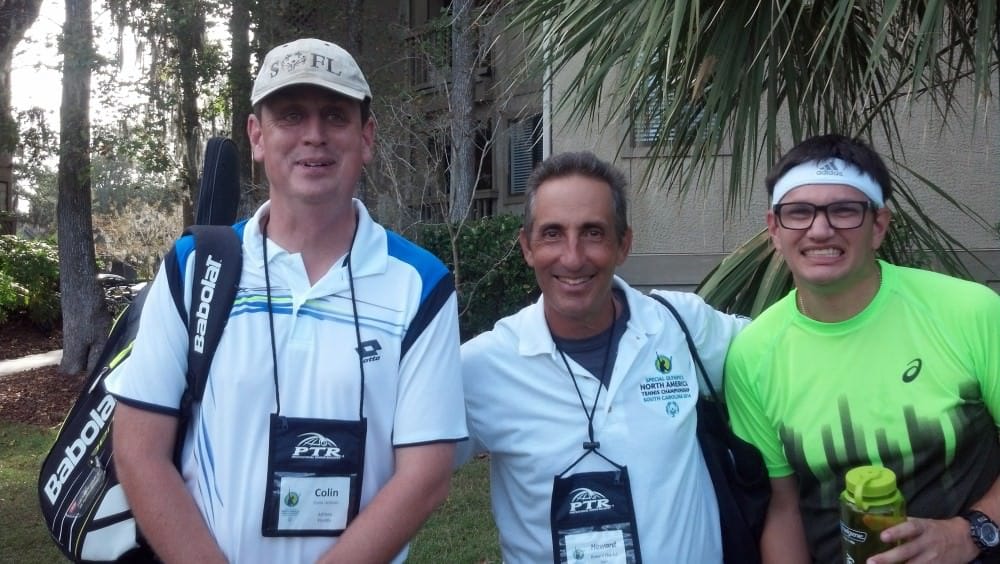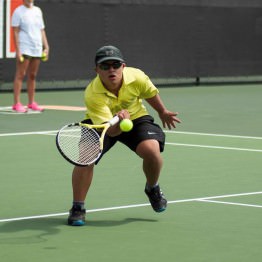May 1st, 2015
Miami Showcases Special Olympics Tennis at Florida Games
Competing in sporting events is fun and exciting to all who participate. But for the disabled, the joy of athletic competition isn’t always available because of their personal challenges.
Thanks to some very special people and organizations, however, the pleasure of competing in tennis tournaments was available to everyone in South Florida at the Special Olympics Florida Area Eleven Tennis Games on April 12th.
More than 100 intellectually disabled tennis athletes participated in the event. It was held at the University of Miami, which donated its facilities. Intellectually disabled players suffer from Down Syndrome, autism, and Cerebral Palsy, among other challenges.
Participants can win in many different categories, which are based on gender, age, and tennis ability. And the fun journey doesn’t end there: They can go on to play in tournaments at the state, national, and world events, as well.
Game, set, and matchmaking
A few of the matches were unified events, where an intellectually disabled player is teamed with a normally functioning player against an athlete of similar ability and disability and his or her unchallenged partner. Teams have had 10 or more practice sessions before they enter the tournament.

Howard Chodak (c) with Brett Williams (l) and Colin Lennon (r) at the North American Tennis Championships.
Matching players with different tennis skills presents quite a few challenges, all of which are coordinated by Howard Chodak, director of tennis development for Special Olympics Florida, a statewide volunteer position. According to Chodak, a USPTA master professional who works out of the Bridges in Delray Beach, many of the disabled athletes play with slower red, orange, or green balls, sometimes with modified rackets, and often on smaller courts. Chodak not only walks the walk, but he also talks the talk: He rewrote the 80-page state manual for trainers into a more manageable 10-page version, augmented by five videos of him teaching.
Free tennis training for the intellectually disabled
According to Linsey Smith, the full-time director of Special Olympics for Miami-Dade County for the past two-and-a-half years, some 27,000 challenged athletes are serviced by the Special Olympics throughout Florida, with more than 4,000 athletes training freely in 17 sports in her region alone, which also includes Monroe County. The community-based tennis training program is held at four facilities throughout the Miami area: Tamiami Park, the Michael-Ann Russell Jewish Community Center in North Miami, Goodlet Park in Hialeah, and J.D. Redd Park in Homestead. It’s funded by the Special Olympics, the USTA Florida Section, and the USTA nationally.
Athletes can enhance their tennis skills in a daytime training program during school hours, and are then transported to Tamiami Park by complimentary buses provided by the Miami-Dade County public schools. The free program offers intellectually disabled players training for one day every week around the year. Tennis teachers are virtually volunteers, offering their expertise and time; they receive just a small stipend for their services.
Help, we need somebody
If the Beatles could ask for help, why shouldn’t the Special Olympics Florida? According to Smith, the organization is always looking for volunteers to help facilitate the program. These volunteers fall into three categories: teaching pros to coach the athletes; officials (preferably trained as such, but also high-level tennis players); and unified partners to play in tournaments.
Be that special person who can help disabled athletes experience the joys of competition. For more information on volunteering, please contact: Linsey Smith at (305) 406-9467.




